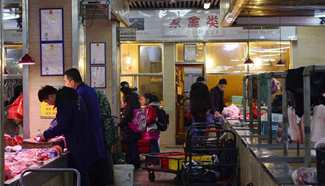HONG KONG, Feb. 22 (Xinhua) -- Hong Kong Financial Secretary Paul Chan Mo-po said on Wednesday that for 2016-17, he forecast a surplus of 92.8 billion HK dollars (about 11.9 billion U.S. dollars) and expected fiscal reserves to reach 935.7 billion HK dollars by 31 March, 2017.
Delivering the 2017-18 Budget, Chan said the 2016-17 revised estimate on government revenue is 559.5 billion HK dollars, 12 percent higher than the original estimate, which is due mainly to the increase in revenue from land sales and stamp duty.
As for government expenditure, the financial secretary forecast a revised estimate of 466.7 billion HK dollars, 4.1 percent or 20.2 billion HK dollars lower than the original estimate.
In view of the current fiscal situation, Chan proposed a series of measures to share the fruits of economic development with members of the public. They include reducing salaries tax and tax under personal assessment for 2016-17 by 75 percent, which will reduce government revenue by 16.4 billion HK dollars, widening the marginal bands for salaries tax from the current 40,000 to 45,000 HK dollars, which will reduce tax revenue by 1.5 billion HK dollars a year.
The global economy operated in low gear in 2016 and recorded the slowest growth since the global financial crisis. The situation was particularly grim at the beginning of the year, affecting the trade performance of Hong Kong and the Asian region. The subsequent abatement of downward pressures on the external front led to a rebound in Hong Kong's export of goods.
As a whole, in 2016, Hong Kong witnessed an overall economic growth of 1.9 percent in 2016. Chan expected Hong Kong's economic growth in 2017 range between 2 to 3 percent.
The unemployment rate averaged 3.4 percent last year, sustaining a state of full employment in general, he added.
Inflation pressure was moderate. The headline inflation rate for 2016 was 2.4 percent and the underlying inflation rate was 2.3 percent in 2016, the fifth consecutive year of easing, he noted.
The headline inflation rate for 2017 as a whole will be 1.8 percent with an underlying inflation rate at 2 percent, he forecast, adding that the still-low global inflation and strong U.S. dollar have lessened the impact of the rise in international oil prices and thus keep imported inflation at a low level.
Talking about the supply of residential flats, Chan said it will increase substantially in the next few years, but the property market may have to face potential risks if the Fed normalizes interest rates faster this year.
According to the Budget, the government will put on sale 28 residential sites, capable of providing about 19,000 residential units. Taking into account of different types of development projects, it is estimated that the potential land supply for private housing in 2017-18 will have a capacity to produce about 32,000 units.
Chan said the government will continue to increase land supply for different economic activities through various measures in order to sustain Hong Kong's competitiveness.
In regard to finance services, Chan noted that Hong Kong possesses the right conditions for developing green finance. The government will beef up efforts to promote the region's competitive capital market and encourage the sector to explore opportunities brought by green finance.
He mentioned that amid the unstable external environment, Hong Kong's financial services industry maintained a robust performance, contributing 18 percent of the GDP and employing over 250,000 people. The industry serves as a key driving force for the region's steady economic growth.
He said that Hong Kong continued to rank top globally in terms of the volume of RMB foreign exchange transactions. With the wider use of RMB in the international arena, the government will continue to explore with Mainland authorities ways to open up more channels for two-way cross-border RMB fund flows.
A number of measures will be implemented to develop Hong Kong into Asia's asset and wealth management center, Chan said.
To facilitate Hong Kong's development into a full-fledged fund service center, Chan said "we propose to extend the profits tax exemption to onshore privately-offered open-ended fund companies," adding that the proposal will help attract more funds to domicile in Hong Kong and build up Hong Kong's fund manufacturing capabilities.
The financial chief said, although the global financial market will remain volatile in the foreseeable future, he believes Hong Kong has the strength to ride out the challenges arising from these changes and seize the opportunities to reinforce Hong Kong's status as an international financial center. Enditem (1 U.S. dollar = 7.75 HK dollars)












